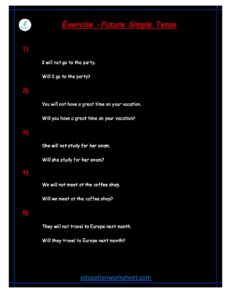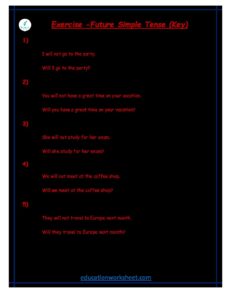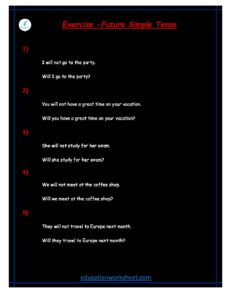changing Future Simple Tense to negative and interrogative worksheets
changing Future Simple Tense to negative and interrogative
The Future Simple tense is a fundamental and versatile grammatical construction in the English language. It is used to express actions or events that will occur at some point in the future. When used in the affirmative form, the Future Simple tense is relatively straightforward. However, when we wish to make negative or interrogative statements in the Future Simple tense, it requires some modification of the basic structure. In this extensive guide, we will delve into the intricacies of converting the Future Simple tense into negative and interrogative forms, offering a comprehensive analysis of the rules, examples, and common mistakes.
Negative Form of Future Simple Tense

Converting a sentence in the Future Simple tense to the negative form is quite simple. To do this, we typically employ the auxiliary verb “will not” or its contracted form “won’t.” Here is the basic structure:
Subject + will not/won’t + base form of the verb + (rest of the sentence)
For example:
- I will not go to the party.
- She won’t finish the project on time.
In these examples, “will not” or “won’t” are used to indicate the negation of the future action, while the base form of the verb (e.g., “go,” “finish”) remains unchanged.
Interrogative Form of Future Simple Tense

When transforming a sentence in the Future Simple tense into an interrogative form, we need to invert the subject and the auxiliary verb “will.” Here is the basic structure:
Will + subject + base form of the verb + (rest of the sentence)?
For example:
- Will you join us for dinner tonight?
- Will they attend the conference?
In these examples, the inversion of “will” and the subject creates a question, making it clear that the speaker is seeking information about a future event or action.
Contractions in Negative and Interrogative Forms
It’s worth noting that contractions are often used in spoken English to simplify and expedite conversations. In the negative form, “will not” is frequently contracted to “won’t,” while in the interrogative form, “will” and the subject are often contracted. Here are some examples:
Negative contractions:
- I won’t attend the meeting.
- She won’t call you back.
Interrogative contractions:
- Will you be there?
- Will he pass the test?
These contractions make the language sound more natural and are commonly used in everyday communication.
Time Expressions with Future Simple Tense
In both negative and interrogative forms of the Future Simple tense, it is common to use time expressions to provide additional context and clarify when the action will occur. These time expressions include adverbs and phrases such as “tomorrow,” “next week,” “in a year,” “soon,” and “next month.”
For example:
- Will you visit your parents next weekend?
- I won’t be available for the meeting tomorrow.
Using time expressions helps to specify the timeframe of the future action or event.
Modal Verbs and the Future Simple Tense

In some cases, modal verbs can be combined with the Future Simple tense to express various shades of meaning. When forming negative or interrogative statements with modal verbs, the structure remains consistent with the rules mentioned earlier. Here are some examples:
- Will you be able to finish the report by Friday?
- I won’t be allowed to leave early today.
In these examples, “will” is combined with modal verbs like “can” and “be allowed to,” and the rules for creating negative and interrogative statements still apply.
Common Mistakes to Avoid
While converting the Future Simple tense to negative and interrogative forms, there are a few common mistakes to watch out for:
- Using “will not” instead of “won’t”: It’s important to use the contraction “won’t” in informal conversations. Using “will not” in everyday speech can sound overly formal.
- Inverting the subject and “will” incorrectly: In interrogative forms, be sure to invert the subject and “will” correctly. For instance, it should be “Will you come?” rather than “You will come?” when asking a question.
- Neglecting time expressions: Using time expressions helps provide context and clarity in future tense sentences. Omitting them can sometimes lead to confusion or lack of specificity.
- Misusing modal verbs: When combining modal verbs with the Future Simple tense, ensure that you maintain the correct structure for forming negative and interrogative sentences.
Practice and Application
To become proficient in transforming Future Simple tense sentences into negative and interrogative forms, it’s essential to practice. You can use the following exercises to reinforce your understanding:
Exercise 1: Negative Form
Rewrite the following sentences in the negative form of the Future Simple tense.
- She will attend the conference.
- I will call you later.
- They will finish the project tomorrow.
- He will help you with your homework.
- We will go on vacation next month.
Exercise 2: Interrogative Form
Rewrite the following sentences in the interrogative form of the Future Simple tense.
- He will join us for the trip.
- They will complete the assignment on time.
- She will visit her grandparents.
- We will order pizza for dinner.
- You will meet with the manager.
By practicing these exercises, you can become more confident in using the Future Simple tense in its negative and interrogative forms.

